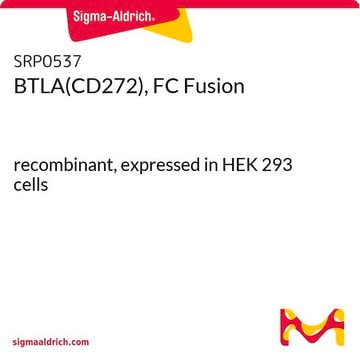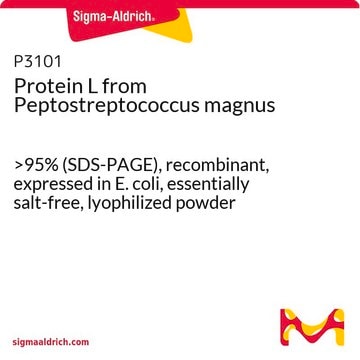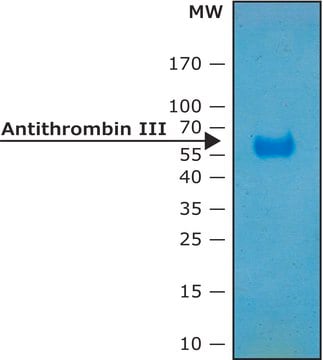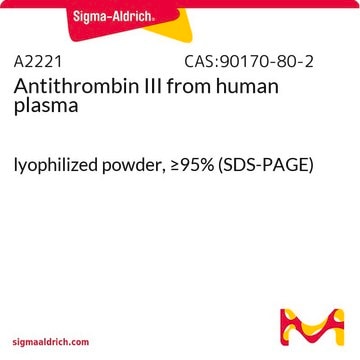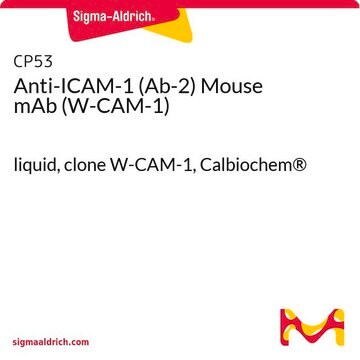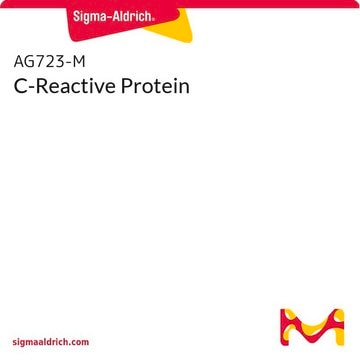SRP5150
Vimentin, His tagged human
recombinant, expressed in E. coli, ≥90% (SDS-PAGE), buffered aqueous glycerol solution
Synonym(s):
FLJ36605, VIM
Sign Into View Organizational & Contract Pricing
All Photos(1)
About This Item
Recommended Products
General description
Vimentin belongs to the intermediate filament family of proteins. It is a key structural component of eukaryotic cells and is associated with lymphocytes and neutrophils. Vimentin exists as a tripartite domain structure. It is expressed in mesenchymal cells. The vimentin gene is mapped to human chromosome 10p13.
Application
Vimentin, His tagged human has been used in the glass surface immobilization in anti-vimentin binding in force measurement by atomic force microscopy (AFM).
Biochem/physiol Actions
Vimentin (VIM) stabilizes cytoskeletal interactions and is crucial for the placement of organelles in the cytosol. It modulates apoptosis in lymphocytes and is involved in the pathogenesis of inflammatory diseases VIM may serve as a potential marker for sepsis diagnosis. It is also essential for lens integrity maintenance.
Vimentin is a member of intermediate filament family of proteins and is an important structural feature of eukaryotic cells. Along with microtubules and actin microfilaments, Vimentin make up the cytoskeleton component of cells. Studies have shown that Vimentin is attached to the nucleus, endoplasmic reticulum and mitochondria, either laterally or terminally. Vimentin plays a significant role in supporting and anchoring the position of the organelles in the cytosol. Thus, Vimentin plays a key role in maintaining cell shape, integrity of the cytoplasm, and stabilizing cytoskeletal interactions
Physical form
Supplied in 50mM sodium phosphate, pH 7.0, 300mM NaCl, 150mM imidazole, 0.1mM PMSF, 0.25mM DTT, 25% glycerol.
Preparation Note
after opening, aliquot into smaller quantities and store at -70 °C. Avoid repeating handling and multiple freeze/thaw cycles
Signal Word
Danger
Hazard Statements
Precautionary Statements
Hazard Classifications
Eye Irrit. 2 - Repr. 1B - Skin Irrit. 2
Storage Class Code
6.1C - Combustible acute toxic Cat.3 / toxic compounds or compounds which causing chronic effects
WGK
WGK 1
Certificates of Analysis (COA)
Search for Certificates of Analysis (COA) by entering the products Lot/Batch Number. Lot and Batch Numbers can be found on a product’s label following the words ‘Lot’ or ‘Batch’.
Already Own This Product?
Find documentation for the products that you have recently purchased in the Document Library.
T Katsumoto et al.
Biology of the cell, 68(2), 139-146 (1990-01-01)
The three-dimensional arrangement of vimentin intermediate filaments (IF) was studied in 3Y1, rat fibroblastic cell line, to elucidate its biological role in the cell. While actin filaments were observed exclusively in the superficial part of the cell, vimentin IF were
Vera L Costa et al.
Clinical cancer research : an official journal of the American Association for Cancer Research, 16(23), 5842-5851 (2010-10-27)
To identify a panel of epigenetic biomarkers for accurate bladder cancer (BlCa) detection in urine sediments. Gene expression microarray analysis of BlCa cell lines treated with 5-aza-2'-deoxycytidine and trichostatin A as well as 26 tissue samples was used to identify
Longxiang Su et al.
Scientific reports, 9(1), 5747-5747 (2019-04-07)
New diagnostic biomarkers or therapeutic targets for sepsis have substantial significance for critical care medicine. In this study, 192 differentially expressed proteins were selected through iTRAQ. Based on cluster analysis of protein expression dynamics and protein-protein interactions, hemopexin, vimentin, and
Frida Danielsson et al.
Cells, 7(10) (2018-09-27)
Vimentin is a protein that has been linked to a large variety of pathophysiological conditions, including cataracts, Crohn's disease, rheumatoid arthritis, HIV and cancer. Vimentin has also been shown to regulate a wide spectrum of basic cellular functions. In cells
R Kawamura et al.
Journal of nanobiotechnology, 14(1), 74-74 (2016-11-05)
The field of structural dynamics of cytoskeletons in living cells is gathering wide interest, since better understanding of cytoskeleton intracellular organization will provide us with not only insights into basic cell biology but may also enable development of new strategies
Our team of scientists has experience in all areas of research including Life Science, Material Science, Chemical Synthesis, Chromatography, Analytical and many others.
Contact Technical Service
